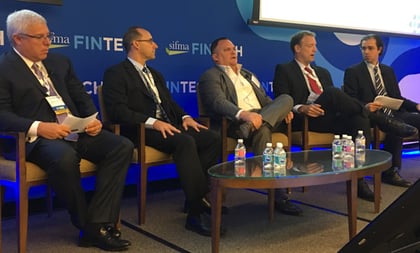Advisors and other financial organizations stand to benefit from artificial intelligence and machine learning applications, as well as regtech and other emerging technologies, as cloud computing becomes more pervasive, but a wide range of challenges remain, industry experts said Wednesday at the Securities Industry and Financial Markets Association Fintech Conference in New York.
When it comes to AI and ML, regulations are an issue and the really difficult part remains translating theory into practice via the implementation and management of these increasingly popular technologies, representatives from companies including Broadridge Financial Solutions and TD Ameritrade said during the panel session “Operationalization of AI.”
Noting that he’s the head of surveillance at TD Ameritrade, Eric Hains said his company has projects “underway right now” with AI and ML. “My particular concern [is] not only does the techniques and technology work for surveillance, but our biggest concern as a firm is bringing along the regulators with us through this process or journey,” he told attendees.
Traditionally, surveillance regulators “expect and understand a rule-based approach,” he pointed out. However, the issue now is that, “as we move to machine learning and AI, one of our biggest hurdles is going to be to bring along the regulators and make sure that they understand the technology [and] they’re comfortable with it,” he explained, adding: “It’s really only then that we feel that they’ll be confident that we still maintain the control environment that we’ve had pre-machine learning.”
Conceding that he’s “not a technologist by any standpoint,” Hains conceded that he faced a “steep learning curve” dealing with ML. Therefore, he said, having a “dedicated group that really does have a deep understanding of what we’re now doing, to be able to not just face the regulators, but to explain it to the rest of us in compliance,” will work to “smooth the path for us” as it goes forward.
Firms, meanwhile, have to figure out where they can apply such technology within their organizations so that it’s most useful. The “rate of change” being seen among AI and other emerging technologies, including blockchain, is happening quickly and “most firms do not have the luxury of” going all-in on all of them, Michael Alexander, president of Wealth & Capital Market Solutions at Broadridge, said. The benefit that a large firm like his has is that it can build a solution with one of the technologies and then “spread out the investments,” he said. He also struck a note of caution, saying companies all too often want to use the “coolest” tool rather than the one that’s most appropriate for their needs.









 September 26, 2019 at 12:55 PM
September 26, 2019 at 12:55 PM








